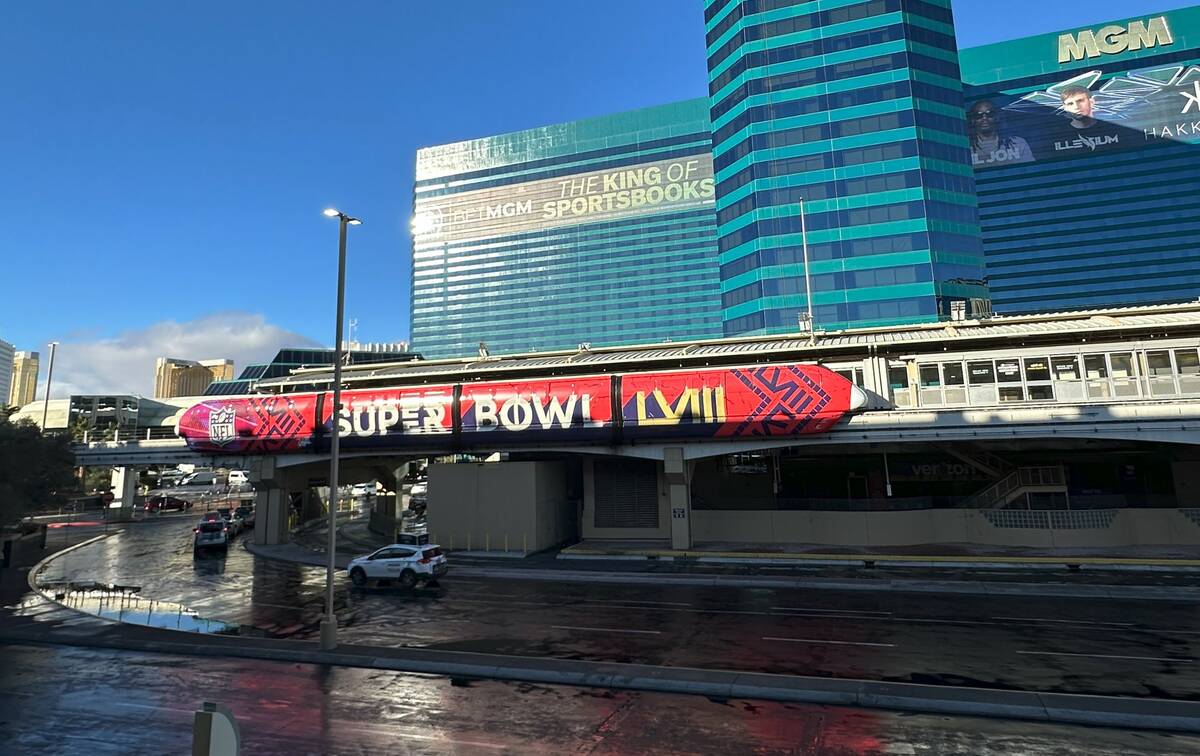From buses to monorail: Array of options for A’s ballpark transportation plan
How fans get into and out of the vicinity of the Oakland Athletics’ planned Las Vegas ballpark is a key detail that still needs to be hammered out ahead of the team’s arrival on the Strip in 2028.
A’s President Dave Kaval said a successful plan for the A’s will include a vast array of transportation modes.
That would include everything from the Las Vegas Monorail, the Boring Company’s Vegas Loop, the Regional Transportation Commission’s Gameday Express service, ride hailing and taxi services and fans walking to the stadium, either from nearby resorts or those parking at one of the 2,500 spaces planned to be included at the ballpark site.
“That’s really important for us. We want to make sure for fans, especially locals, the ingress and egress is simple,” Kaval told the Las Vegas Review-Journal. “So we have to do everything we can. … We need to have all the above. We need to have the monorail, we need to have the Boring Company. We need to have good places for people to park in a distributed way. We need to have bus service, we need to be easy for people to walk. All those things together will create an integrated traffic management plan that will be easy for fans.”
To make such a plan possible, the A’s will engage the help of the Las Vegas community, Clark County, the Nevada Department of Transportation, the RTC and other key stakeholders.
Clark County controls the transportation-related approvals on the Strip, including at the intersection of Las Vegas Boulevard and Tropicana Avenue where the ballpark is planned to be built. When the ballpark/resort traffic plan is finalized, Clark County Commissioner Jim Gibson, whose district the stadium will be located in, said everything has to work.
Gibson, who also serves as chairman of the Las Vegas Convention and Visitors Authority board of directors, said Clark County officials want to see the master plan for the entire 35-acre site, including the resort Bally’s Corp. plans to build once the Tropicana is demolished, before they can fully determine what the transportation plan will look like.
“We’ve got to see it all,” Gibson said. “You can’t make an estimate on the effect of something if you don’t have an expected headcount.”
To that point, Gibson said Bally’s is working at an accelerated pace with the Tropicana’s scheduled April 2 closure just weeks away.
“We’ve been talking to them all along and they made a decision on what kind of building they want,” Gibson said. “They’re working on finalizing things.”
As part of Senate Bill 1, the A’s public stadium funding mechanism, the county will contribute $25 million to infrastructure improvements needed around the ballpark site. The county also is on the hook for another $120 million of the up to $380 million in public funding earmarked by SB1.
Gibson is hopeful that Boring’s Vegas Loop will be part of the transportation equation for the ballpark come 2028. But he noted the Elon Musk-owned operation isn’t working at the same pace as the county is on the project.
“They’re in control of that, we’re (Clark County) not,” Gibson said. “When they file their applications for building permits we process them as quickly as they can be done. I would say that we’re ahead of them.”
Still, Gibson said he was hopeful the Vegas Loop will reach the A’s ballpark before opening day at the beginning of the 2028 MLB season.
“I certainly hope so,” Gibson said. “I don’t know who can strand that many millions of dollars waiting to come online. I guess the owner (Musk) has more capacity than most do, but it would be nice if we can count on them.”
Boring, like all other Musk-owned entities, doesn’t have a media relations team so company officials could not be reached for comment.
Even though the monorail is slated to be decommissioned at some point in the next several years, Gibson said there is a chance the LVCVA, which owns the transportation mode, could look to repurpose it.
“The monorail will have to be decommissioned at some point in time in its current structure,” Gibson said. “That’s largely because the equipment is old. The structure for the entire system was built specifically for that equipment and over time Bombardier (the builder) will not have parts and things to fix things. When that happens, we still have a guideway up there and the guideway is usable. We’ll certainly explore every other alternative use for the guideway system.”
With the monorail’s southern portion ending at the MGM Grand across the street from the A’s planned ballpark, it could be a way for visitors and locals alike to arrive at the ballpark.
“Some of the people who live here will go to a parking station somewhere along that route and get on the monorail and take it over,” Gibson said.
RTC CEO MJ Maynard said she and the transit authority are committed to working with the A’s, like they are with other public and private partners, to ensure residents and visitors have safe and efficient transportation options.
“We welcome the Oakland Athletics, and we look forward to continuing to work with everyone involved to support a smooth integration into our growing transportation infrastructure,” Maynard said in a statement.
NDOT has yet to have a formal meeting with the A’s regarding stadium transportation, according to department spokesman Justin Hopkins.
Whatever is the ultimate outcome of the transportation plan for the A’s ballpark and Bally’s hotel site, Gibson is looking forward to playing a part in creating it.
“I think there are lots of alternatives,” Gibson said. “It’s going to be fun to get some real talented people in a room and plan it all out.”
Contact Mick Akers at makers@reviewjournal.com or 702-387-2920. Follow @mickakers on X. Send questions and comments to roadwarrior@reviewjournal.com.


















